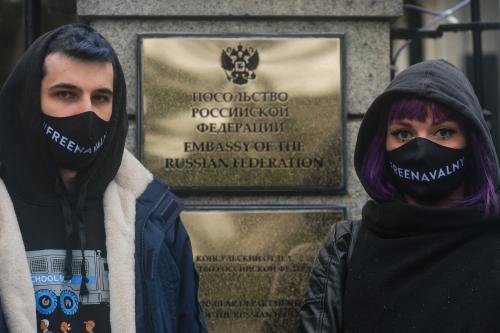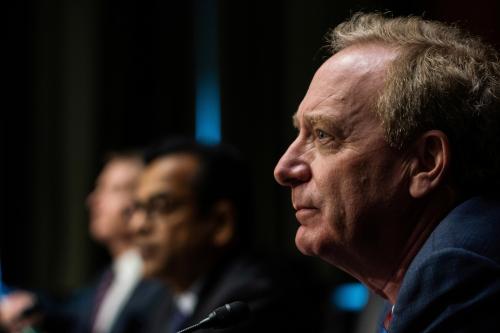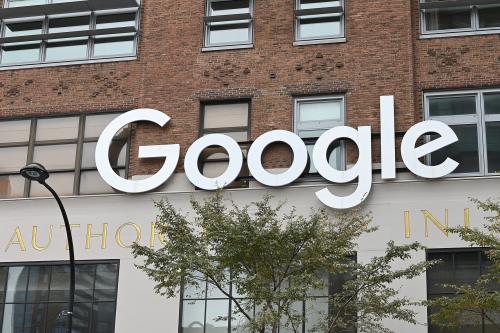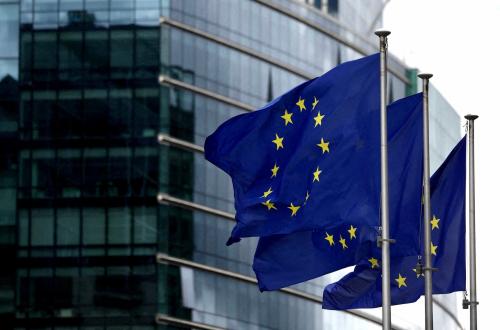This piece originally appeared in Lawfare.
On April 28, the Biden administration announced a new global partnership that sets norms for the use of technology by nation-states: the Declaration for the Future of the Internet. While the declaration might seem like a reproach of the digital authoritarianism of Russia and China, it is far more likely to warn off wavering democracies from internet transgressions.
The statement was signed by 61 nations and aims to establish a code of practice for how democratic countries should engage with the web. The declaration’s vision for the internet is broad—aspiring to promote universal internet access, protect human rights, ensure fair economic competition, design secure digital infrastructure, promote pluralism and freedom of expression, and guarantee a multi-stakeholder approach to internet governance. While this is an ambitious scope for a three-page nonbinding document, the priorities are admirable and reflect the diverse interests of the signatories. This is especially notable when compared to an early draft leaked in 2021, which was far more focused on U.S. economic interests.
At a glance, it is easy to see why much news coverage framed the agreement in opposition to China and Russia, as some Biden officials have presented the declaration as an alternative to the model of digital authoritarianism. This contextualization also aligns neatly with the mindset of strategic competition toward China, which is prominently held by some members of the Biden administration. However, China and Russia are all but certain to ignore this declaration. The Biden administration knows this and is more likely trying to affect the behavior of wavering democratic nations that have committed questionable, although not outright authoritarian, internet transgressions.
No single nation on the list seems dramatically out of place, yet many of the participating countries cannot boast a flawless record on internet freedoms. Colombia’s digital freedoms have recently been in decline, and especially concerning are efforts by the Colombian military to expand online surveillance of journalists and politicians. Niger, despite completing its first-ever peaceful and democratic transition of power in 2021, also experienced around 10 days of state-initiated internet blackout. Hungary, apparently the most reluctant signatory in the EU, targeted journalists with Pegasus, a highly invasive spyware system. Israel is guilty of approving the sale of Pegasus not just to Hungary but also to Mexico, where it may have been used in mass surveillance of government critics, and to Saudi Arabia, which infamously used the spyware in its plot to surveil and later murder Washington Post journalist Jamal Khashoggi (Mexico and Saudi Arabia are not signatories). Oh, also, the former president of the United States is predominantly responsible for an online disinformation campaign that has undermined faith in the nation’s core democratic process.
These are certainly troubling behaviors for democratic nations, yet they are symptoms of an ongoing struggle for democratic preservation, not the presence of more systemic digital authoritarianism as in China or Russia. It is in these cases that the declaration can make a difference at the political margins. This is especially true if the declaration partners hold one another’s feet to the fire. By both privately and publicly criticizing these state behaviors, as well as offering legitimacy to pro-democratic voices that are resisting state overreach, the coalition of signatories can perhaps tilt the scales.
There are signs from the Biden administration that this more modest goal is the project’s true ambition. At the declaration’s White House launch event, National Security Adviser Jake Sullivan asserted that it is “not … about what we are against, it’s about what we are for. It’s about an affirmative vision.” Sullivan is contending that the declaration is about the behavior of the signatories—not the rest of the world.
Comments from Tim Wu, a White House special assistant co-leading this initiative, also support this interpretation. In a prepared speech to the Internet Governance Forum in December 2021, Wu asked: What should the duties and responsibilities of a nation-state be with respect to the internet? He then went on to list specific practices that democratic states should rise above, including state-condoned disinformation, internet shutdowns, online radicalization, economic concentration and government surveillance. All of these harms can be illustrated, of course, by at least one of the declaration’s signatories. However, it is clear from Wu’s speech that the immediate target of the declaration is not China but, rather, improving the behavior of signatory nations and those nations that may realistically aspire to join.
The reason to point this out is not to argue that the declaration is hypocritical but instead to note that it can have impact—especially if it leads to a more self-critical conversation within this group of nations, in which they directly and, if necessary, publicly identify violations of the declaration’s principles. Of course, without this frank discussion, the critics calling the declaration “redundant and distracting” will be proved right, especially as no enforcement mechanisms are written into the statement.
The White House is correct to think a renewed effort is worthwhile. According to Freedom House, global internet freedom has declined for 11 consecutive years. Unfortunately, the decline is not isolated to the web, as the global recession of democracy continues unabated. Freedom House writes that “nearly 75 percent of the world’s population lived in a country that faced deterioration” in 2021. One metric puts the global height of democracy in 2012, suggesting a full decade of decline. The Economist Intelligence Unit’s Democracy Index scored global democracy at its lowest point since the index started in 2006. Another study suggests that the average citizen of the world is experiencing the same level of democracy as in 1990 during the collapse of the Soviet Union.
At best, the expansion and modern shaping of the internet has emerged contemporaneously with this enormous challenge to the democratic world. More likely, it has contributed to it. A meta-analysis of almost 500 research studies found that digital media has led to declining institutional trust, growing polarization and an advantageous environment for populists in established democracies. An ongoing literature review examining the interaction between social media and democracy is pointing in a similar direction. So, not only is there democratic backsliding both on and off the web, but there may also be a self-perpetuating interaction between the two.
This is the dire context to which the Biden administration is responding. It’s also clear evidence that the Declaration for the Future of the Internet is not enough, even though the effort is valuable. It still pales in comparison to the comprehensive regulatory systems for online platforms that the European Union is implementing through the Digital Services Act, Digital Markets Act, the AI Act and others. Further, it is not sufficiently backed by an explicitly pro-democratic technology policy agenda, although there are related efforts by the White House to expand high-speed internet access, fund research and development into privacy preserving technologies, and enforce more consumer protections.
Despite its nonbinding nature and lack of enforcement, this declaration is better than none. The Declaration for the Future of the Internet at least shows a marked and renewed interest in fighting for the web’s potential for democracy—certainly an improvement over the prior two presidential administrations. If the Biden administration and the coalition of signatories are willing to follow through with hard conversations that push back on digital transgressions, then there is progress to be made for the future of the internet.
The Brookings Institution is committed to quality, independence, and impact.
We are supported by a diverse array of funders. In line with our values and policies, each Brookings publication represents the sole views of its author(s).







Commentary
The Declaration for the Future of the Internet is for wavering democracies, not China and Russia
May 9, 2022